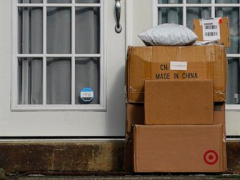A sweeping new U.S. tariff on products made in China is expected to increase the prices American consumers pay for a wide array of products, from the ultra-cheap apparel sold on online shopping platforms to toys and electronic devices such as computers and cellphones.
An additional 10% tariff on all Chinese goods took effect Tuesday, while the U.S. Postal Service announced it will stop accepting parcels inbound from China and Hong Kong until further notice.
The previous day, President Donald Trump agreed to pause his threatened tariffs against Mexico and Canada for 30 days following negotiations on Trump’s demands for the North American nations to take steps to reduce illegal immigration and the flow of drugs such as fentanyl into the U.S.
After failing to get a similar White House reprieve, China struck back with retaliatory tariffs on some U.S. goods that are set to begin next week.
The sheer volume and variety of the China-made merchandise sold in the U.S. means residents would probably see the prices of many typically inexpensive items tick higher if the tit-for-tat tariffs persist.
These are some of the products most likely to be impacted:
The U.S. imported about $427 billion worth of goods from China in 2023, the most recent year with complete data, according to the U.S. Census Bureau. Consumer electronics, including cellphones, computers and other tech accessories, make up the biggest import categories.
China is a dominant production engine for tech gear, including for American companies like Apple that have their products assembled in the country. In 2023, China accounted for 78% of U.S. smartphone imports and 79% of laptop and tablet imports, the Consumer Technology Association trade group reported.
The tariffs also may affect how much consumers pay for typically inexpensive clothing, shoes and kitchen items like pots and pans, as well as the big-ticket items, such as appliances, furniture and auto parts.
Jay Salaytah, 43, who runs his own auto repair shop in Detroit, said he bought some pieces of equipment sooner than he might have, anticipating they would cost more if Trump implemented his campaign promise to use import tariffs as a tool to promote U.S. manufacturing.
“I knew the costs were going to go up, and these are manufactured in China,” Salaytah said of a probe test light he purchased before Tuesday’s tariff went into effect.
In addition to imposing a new tariff on Chinese imports, Trump’s executive order also suspended a little-known trade exemption that allowed goods worth less than $800 to come into the U.S. duty-free. The order left open the possibility for the loophole to still be used with shipments from other countries.
The trade rule, known as “de minimis,” has existed for nearly a century. It came under greater scrutiny in recent years due to the rapidly growing number of low-cost items coming into the U.S. from China, mainly from prominent China-founded online retailers such as Shein, Temu and Alibaba’s AliExpr





